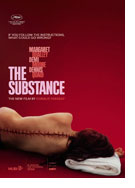

Opening 19 Sep 2024
Directed by:
Coralie Fargeat
Writing credits:
Coralie Fargeat
Principal actors:
Margaret Qualley, Dennis Quaid, Demi Moore, Hugo Diego Garcia, Oscar Lesage
Elisabeth Sparkel (Demi Moore) is a star under the motto “Sparkle your life with Elisabeth.” Gradually, she grows older, her fame slows, and she is fired. In order to become younger, she decides to take a “substance” which can change her DNA. She lies naked on the floor. Her back opens along her spine, and a new version of herself climbs out. “Remember you are one. You are the matrix, a better version of yourself.” This new version looks similar to the original Elisabeth, but she is younger, skinnier, and has blue eyes. This is Sue (Margaret Qualley), who sews up Elisabeth’s back and drags her into a back room. Sue takes over Elisabeth’s life: her beautiful apartment, her friendships with men, and her job which includes moderating the upcoming New Year’s Eve show. They are supposed to switch back and forth every seven days. Soon, Sue runs out of the “stabilizer” which she has been taking in order to keep things going. A third character appears: a monster, this time coming out of Sue’s back.
The Substance begins with an egg being cracked onto a plate. The yellow yoke is divided, so now we have two eggs—symbolic of Elisabeth and Sue, who both often wear yellow raincoats. Life is confusing, but “Pretty girls should always smile.” The film is being advertised as a horror film and there is indeed much blood, not only nosebleeds, especially in the end. The Substance is definitely worth our viewing, not only for the interesting topic of becoming a “new” and “better” person, but also for the actresses Demi Moore and Margaret Qualley. The topic gives us much to think about. Should we consider a new “self”? The Substance won best screenplay at the 2024 International Cannes Film Festival. (Becky Tan)
French writer-director Coralie Fargeats’ stinging satire unabashedly, unequivocally, and unashamedly focuses on the prevalent and toxic atmosphere surrounding age, women, and, bemusedly unfettered by age, greed. How better than by Fargeats’ screenplay tying it to fame and assembling an all-star cast to pull off this witty, wicked societal pun.
Demi Moore stunningly, spectacularly portrays Elizabeth Sparkle—what a name—the very successful Oscar® winner who, taking a page from Jane Fonda’s playbook, now has her morning aerobics television program that puts a sweat on kids half her age. Most would be envious to look so good. As fate will have it, one morning after taping a show she is in a position to overhear a telephone conversation, then driving home is distracted by a billboard, and ends up at a local hospital. Before being released the doctor’s assistant (Robin Greer) gives her a tip that “changed his life.” Meanwhile, Dennis Quaid makes an audacious production out of portraying Harvey, the network producer (bet he had fun, too). Harvey, of course, gets the last word on everything, and everyone bows and scrapes to him. Startling sound design and microscopic camerawork intensify the Harvey-effect. Sparkle, desperately wanting to sparkle again, follows the trail to THE SUBSTANCE. “Have you ever dreamed of a better version of yourself?” And begets the Sue character that Margaret Qualley brilliantly breathes life into with nuanced, calculated subtleties. What gets in the way is the timing, and petulant wrangling culminating with the network’s New Year’s Eve extravaganza. Indubitably, it is guaranteed to impress Harvey speechless.
Beyond Coralie Fargeat’s bold work at the helm, a fearsome three cleverly, evocatively and creatively imbue each scene’s depth perspicaciously to captivate viewers attentiveness: cinematographer Benjamin Kracun’s daring choice of shots, Valérie Deloof’s exemplary sound design, and Raffertie a.k.a. Benjamin Stefanski’s wonderfully idiosyncratic yet measured music. Stanislas Reydellet’s production design, Cécilia Blom’s set decoration and the magic the Makeup Department perform is palpable; the prosthetics and make-up, particularly toward the end are doozies. Editors Jerome Eltabet, Coralie Fargeats and Valentin Féron manage to balance and expand the inherent psychological and physicality of the characters’ boundaries and keep the narrative flowing albeit late in the game overextend bits deflecting from its focus.
The Substance is a visceral experience into what, appearing glamorous to outsiders, is dazzlingly uncovered at its outset—shallow, hollow, fleeting. It received an 11-minute standing ovation, and walkouts, at its Cannes Film Festival world premiere. Before gnawing away at yourselves thinking about a “better version,” see The Substance. You will not regret it. (Marinell Haegelin)